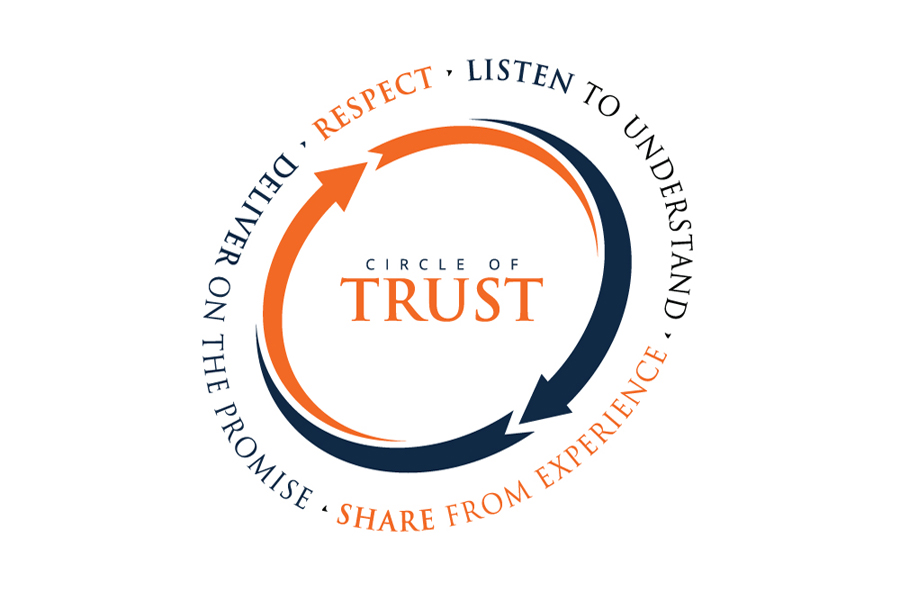A few years ago, I was thinking about just how much the concept of trust affects our lives. This single construct, trust, allows us to decide so many things: who we marry, who we choose as friends, and even who we choose to do business with. Trust becomes the key factor in almost every life decision. The problem with trust is that it takes so long to develop — or does it?
I set myself on a journey to discover a process in which trust could be developed faster. What I learned has been incorporated into a system I call the Circle of Trust. While trust is a complicated subject, and there are so many variables that can affect trust, the Circle has taken the concept and broken it down into the lowest common denominators.
 The whole system starts with respect. I am not talking about the type that is earned. This is the basic respect each of us should give each other as human beings. Start with respecting the person across from you, understand that they have the same basic human needs, wants, and desires that you do. In future articles, we will work on this subject all on its own, but for now, if we can agree that we can give others the respect they deserve for being part of humanity, you can see where we are going.
The whole system starts with respect. I am not talking about the type that is earned. This is the basic respect each of us should give each other as human beings. Start with respecting the person across from you, understand that they have the same basic human needs, wants, and desires that you do. In future articles, we will work on this subject all on its own, but for now, if we can agree that we can give others the respect they deserve for being part of humanity, you can see where we are going.
Listen to Understand
This is probably my favorite topic to discuss. I first read The 7 Habits of Highly Successful People, by Steven Covey, years ago. In this book, what stood out more than any other habits, was on page 252, in the chapter about the 5th habit. “Most people do not listen with the intent to understand; they listen with the intent to reply.”
Think about this for a minute. Watch how others listen to your stories, or how you listen to theirs. I know for years, I would want to jump into a conversation someone was sharing and put my two cents in. “Oh, yeah, I have been there too! When I went, we saw…” or, “No, no, no, you took that all wrong, what they meant was…”
Analyzing why we do this, I could only come up with a few reasons. The first is that we want to be cool, or be in the know. We want to prove we can relate, and therefore are relatable. The problem with this, is that this sort of conversation works contrary to what we really intended. By chiming in, we not only inadvertently cut the other person off, but also we may completely misdiagnose what the person wanted to convey.
People Just Want to Be Heard
One of the things I have learned over the years is that people simply want to be heard. Their goal in telling a story about themselves or their experiences is so you get to know them better. By engaging prematurely with your “response,” there is inevitably a feeling that they were not heard. This is translated into, “this person only cares about themselves, and their needs.”
This first, seemingly simple act of listening with the intent to understand, will lead the other person to feel that they matter, and that you care. This, in itself, starts to build trust. Once that feeling starts, it opens up more options; one of those is the ability to share your experience.
Share from Experience
Nobody wants to be told what to do! Uninvited advice is nothing more than criticism. Few of us deal well with criticism. Yet, our friends do want to hear our stories. I have been apart of two organizations, Nar-Anon, as well as EO, who practice this approach to communication.
Rather than giving advice, both of these groups have built sharing into their “rules.” This practice is to share from your experience, and tell a story that may closely relate to the one you just heard. The relationship may be a physical one, or it may be an emotional one. An emotional experience share is one that elicited the same type of feeling you have had, that related to the feeling you heard about from the other person in the conversation.
Relating to feelings is, by far, a more powerful experience than relating physically. It shows that you have really heard the other person, and that you recognize and understand where they are coming from. This type of vulnerability will further develop the respect that the other person has for you. When the process is reciprocated, it will drastically improve the respect you have for them as well.
Realizing the Circle of Trust
This concept completes one cycle on the Circle of Trust. It is my contention that, within three short cycles of engaging in this behavior, you will have developed a relationship — a relationship that is deep, because it has been built on respect and trust.

